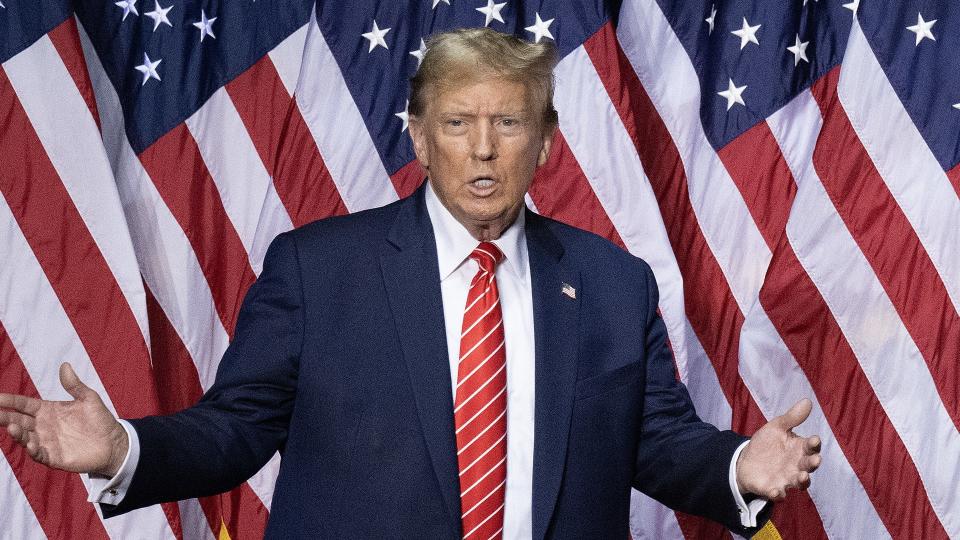Trump Wants To Eliminate Income Taxes: Here’s What That Would Mean for the Economy and Your Wallet

Former president Donald Trump recently suggested that he is considering instituting a policy of tariffs that would lead to the elimination of the federal income tax.
Check Out: Trump-Era Tax Cuts Are Expiring — How Changes Will Impact Retirees
Read More: 4 Genius Things All Wealthy People Do With Their Money
While the idea of eliminating income taxes sounds appealing to a lot of people, here’s what it would mean for the economy and your wallet.
Wealthy people know the best money secrets. Learn how to copy them.
How Tariffs Work
A tariff is a tax that is levied on imported goods. It is typically used to increase the cost of foreign-made products, particularly those that come from countries that have significantly lower labor and materials costs, or those who allow unfair trade practices. The effect of a tariff is to level the playing field for domestic companies who keep jobs local and are subject to the labor laws of the United States. Tariffs are paid to the U.S. government before foreign goods can be brought into the country.
The idea of a tariff is that the additional cost incurred by the foreign manufacturer will be passed on to the consumer in the form of a higher retail price. During Trump’s presidential term, he used tariffs to increase the cost of goods made in China, so that American goods could be priced more competitively.
The Impact of an All-Tariff Plan
If all imported products coming in to the United States had increased tariffs, there would be short-term and long-term impacts. The short-term impact would be that prices would rise on all imported goods. Consumers could opt to either pay the higher price for the imported product or choose a domestic product, which would also typically have a higher price than the pre-tariff imported product. No matter which choice the consumer makes, the price they would pay would be higher than the previous price of the imported product. So overall prices will rise.
The longer-term effect would be a reduction in the quantity of foreign goods imported into the United States. The law of supply and demand tells us that when prices go up, demand goes down and this, after all, is the goal of the tariff — to reduce imports. There will be fewer imported goods available in the United States, which could also drive up prices overall.
Explore More: Billionaires vs. the Middle Class: Who Pays More in Taxes?
The Impact of Substituting Tariffs for Income Taxes
The concept of replacing income taxes with the revenue from tariffs also has short- and long-term impacts. In the short term, the ‘all-tariff’ plan would act as a consumption tax — a sales tax on steroids, if you will. Because the cost of a tariff is passed on to the consumer, and consumer prices will go up, consumers are paying more for everything they buy.
This type of consumption tax affects lower-income consumers on a disproportionate basis. People who spend a higher percentage of their income on necessities — housing, utilities, food, clothing, etc. — would pay a higher amount in tariffs, relatively speaking. Those who spend less on necessities, or who earn income from investments, would pay less.
On a longer-term basis, the intended effect of a tariff is to reduce the amount of imported goods. So, the all-tariff plan might eliminate the need for income taxes in the short term, but if it works as intended, it should bring in less money over time. The current income tax system in the U.S. is designed to bring in more money over time, as incomes rise.
Keeping Up With the Joneses Under an All-Tariff System
Tax-weary consumers might think that replacing income tax with tariffs would be a good thing for them. The truth is, it will benefit the wealthy far more than the lower and middle classes.
Here’s an example. Two families, the Smiths and the Joneses, each have the same monthly necessary expenses, except for their mortgages, of $6250, or $75,000 a year. (We’ll exclude their housing costs from this exercise, since housing wouldn’t be affected by a tariff.) The Smiths have annual income of $150,000, which barely covers their expenses. The Joneses, on the other hand, have an annual income of $300,000, which allows them to easily cover expenses and put some money into savings. So, the Smiths are paying a higher percentage of their income on necessities.
Under a tariff only plan, each family would pay the same amount — they have equal monthly expenses excluding housing, so the increase they would see from tariffs would be the same. Yet the Joneses have double the annual income of the Smiths.
Under the current progressive income tax system in the United States, a family earning $300,000 per year would pay more than a family making $150,000 a year. Replacing the income tax system with a tariffs-only system turns this on its head and shifts the burden from higher-earning households to those that earn less.
As appealing as eliminating federal income taxes might sound to middle- and lower-income taxpayers, an all-tariff system would benefit the wealthy to a far greater degree.
More From GOBankingRates
6 Things to Try This Week if You're Behind on Your Savings Goals
4 Reasons Retired Women Need More Money Than Men -- And What To Do About it
This article originally appeared on GOBankingRates.com: Trump Wants To Eliminate Income Taxes: Here’s What That Would Mean for the Economy and Your Wallet

 Yahoo Finance
Yahoo Finance 